 We’ve been out selling books with several good groups, meeting new customers and old friends, jacked up on caffeine and adrenaline and a bit of Holy Spirited energy to serve God’s people, even if it means packing boxes at 2 am, driving miles through heat or rain, lugging hundreds of heavy boxes up or down stairs and down hallways, setting up books with more theological diversity then most people ever see, anywhere. From the classic marble and wood and stained glass of Lancaster Seminary (yes, it reminds us of Hogwarts) to the modern, sleek beauty of the new performing arts center at Messiah College, to other nice or not so nice spaces, we’ve brought out pop-up bookstore on the road, grateful for the trust groups put in us to offer our resources for their events.
We’ve been out selling books with several good groups, meeting new customers and old friends, jacked up on caffeine and adrenaline and a bit of Holy Spirited energy to serve God’s people, even if it means packing boxes at 2 am, driving miles through heat or rain, lugging hundreds of heavy boxes up or down stairs and down hallways, setting up books with more theological diversity then most people ever see, anywhere. From the classic marble and wood and stained glass of Lancaster Seminary (yes, it reminds us of Hogwarts) to the modern, sleek beauty of the new performing arts center at Messiah College, to other nice or not so nice spaces, we’ve brought out pop-up bookstore on the road, grateful for the trust groups put in us to offer our resources for their events.
Nearly the first to arrive and always the last to leave these gatherings, Beth and I have time to ponder the event as we tear down, debriefing what we’ve heard, sharing about the people we’ve chatted with, reviewing the books that sold (or the ones that didn’t, always a curious, depressing matter.) Each event is a blessing, even though we sometimes come away perplexed about the habits, customs and theologies of groups that aren’t exactly our own.
LONG, WIDE PEWS
Which reminds us of just how diverse the church is, how long and wide the figurative pews are with folks sitting here or there, scattered all over the place. As passionate as we are about being ecumenical and serving the vast array of groups that we do, it isn’t always pleasant, holding this diversity together. From our local church to our on-line customer base to our conference friends, it is hard, knowing how broken the Body is.
UGH
Just a few weeks ago an esteemed congregation from the conservative, evangelical network called the Gospel Coalition had a meltdown with accusations of inappropriate, heavy-handed abuse of authority. I have been sad to see a seemingly responsible, gospel-centered church so confused, but also have been troubled hearing the harsh judgements back and forth about this church. (Surely there is toxic stuff in other sorts of congregations; the ultra-conservative church culture of the Duggarts aren’t the only breeding grounds for religious weirdness, and those who throw stones should be careful.)
TONY CAMPOLO
And then the internet lit up a week ago up with the revelation that our friend, the famous Baptist evangelist and social action advocate Tony Campolo, came out in favor of full inclusion of gays and lesbians in the church. Some of the mainline churches who we’ve served with our book displays – the Penn Central UCC had me do two workshops on “Reading as a Spiritual Discipline” for the sake of church renewal just a few days ago – have long settled this matter, with creative exegesis of Biblical texts and their convictions that (perhaps like the Jerusalem Council in Acts) the Spirit can guide us into new understandings of old rules. While some of our friends were rejoicing that Tony finally turned faithful on this, others were going ballistic.
HERESY?
That most evangelicals and Catholics disagreed with Dr. Campolo makes sense, but that some would say that because we disagree about exegesis of a few passages about this particular topic, Campolo is now “apostate” and “heretical” is troubling, and is, in my view, itself bad theology. A dear friend barbed me with this accusation of “heretical” (we attend a PCUSA church) but that oddly didn’t hurt, because I know the friend loves me, even if he is sloppy in his word choice. However, I am grieved at the hard stuff some have said about Tony. The historic creeds of the church say nothing about our detailed philosophies of how the Bible works, and nothing about contemporary, ethical issues (from war to sexuality, science to art, poverty to bio-ethics.) Not all viewpoints are equally consistent with Biblical truth or appropriate for the faithful, and it is never acceptable to disregard Scriptural teaching, but surely there are some issues on which we might agree to disagree, without breaking fellowship or using words like apostasy. In Romans 14, Paul himself suggests there are “disputable matters” over which we can respect the conscience of brothers and sisters with whom we disagree.
(Mennonites and other Biblical pacifists have long thought that other evangelicals and main line Protestants are Biblically unfaithful and theologically liberal for disregarding or explaining away what they see as crystal clear texts and Biblical teachings – that war and killing is worldly and a sin to which Christians are called to respond with Christ-like nonviolence – but they do not suggest that those with more traditional views are thereby heretics. They do not break fellowship over the fact that others disagree with their literal views of these Bible texts, and I admire them in their generosity in this matter, even thinking it could be a model for other disagreements within the Body of Christ.)
AGREE TO DISAGREE BECAUSE WHAT WE HAVE IN COMMON IS PRECIOUS
So, it may be a healthy spiritual practice to agree to disagree about some things, even things we hold dear (as do Biblical pacifists about Jesus’s teaching about nonviolence, for instance.)
For instance, in a startling pastoral letter to his own famously charismatic Vineyard congregation, expanded and published into a book called Letter to My Congregation (David Crumm Media; $16.95), pastor Ken Wilson shared his own conviction that same sex relationships may best be considered within the local congregation in this way, as a Romans 14-type “disputable matter” not worthy of breaking fellowship over, and invites others at his Vineyard congregation to stay in conversation, in fellowship, even though he and his leadership have shifted in their pastoral position regarding full inclusion of gays, lesbians, and those who are transgendered.
Although my point in this rumination is to invite us to more civility in our discourse, greater tolerance with our conversation partners, even giving others “the benefit of the doubt” that they’ve done homework and made serious Biblical evaluation in whatever views they hold, it might be wise to  suggest — on this very topic of discussions about differences in theologies of inclusiveness in the church of GLTB believers — the book I have mentioned before as the best I can recommend for deeper, more faithful, more generous conversations, called Generous Spaciousness: Responding to Gay Christians in the Church by Wendy Vander Wal-Gritter (Brazos Press; $16.99.) You can see my previous (brief) remarks about it here, when I named it one of the Best Books of 2014.
suggest — on this very topic of discussions about differences in theologies of inclusiveness in the church of GLTB believers — the book I have mentioned before as the best I can recommend for deeper, more faithful, more generous conversations, called Generous Spaciousness: Responding to Gay Christians in the Church by Wendy Vander Wal-Gritter (Brazos Press; $16.99.) You can see my previous (brief) remarks about it here, when I named it one of the Best Books of 2014.
EUB, UNITED METHODIST, LUTHERAN, BRETHREN … and EVANGELICAL
Beth and I were raised in fairly conventional mainline denominational churches. My small home church, where I was taught about salvation and Jesus and living right, was EUB, before merging with the Methodists in 1965, and Beth was raised Lutheran, learning early on about church history and liturgy, law and grace. And while she has some Anabaptist blood in her family background, I think I’ve got some in my veins. Yet, I was shaped primarily by different sorts of evangelicals, charismatics, teachers of conservatively, Reformed, systematic theology and worldviewish, Dutch neo-Calvinists who called themselves reformational as they promoted the Lordship of Christ over all of life. Sure I did a stint, happily, at the progressive faith-based social action mission, the Thomas Merton Center in Pittsburgh, and knew the radical Berrigan brothers. Jim Wallis of Sojourners was the first book signing we did in our store 30 some years ago, I think.
STREAMS OF LIVING WATER
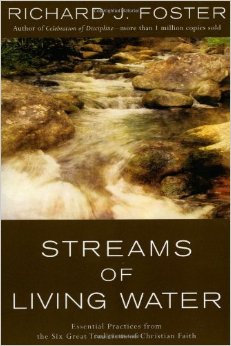 You can see why I really, really love Richard Foster’s mature and wise book about honoring the strengths of the diverse streams of spirituality that flow through the church, Streams of Living Water: Celebrating the Great Traditions of Christian Faith (HarperOne; $15.00.) I resonant and value each of these “streams” and am glad for their renewing influences in my own life. At heart, though, I am an evangelical, deeply committed to the standard fundamentals of the faith, the first things of the gospel, perhaps a bit more then what Lewis called a “mere Christian.”
You can see why I really, really love Richard Foster’s mature and wise book about honoring the strengths of the diverse streams of spirituality that flow through the church, Streams of Living Water: Celebrating the Great Traditions of Christian Faith (HarperOne; $15.00.) I resonant and value each of these “streams” and am glad for their renewing influences in my own life. At heart, though, I am an evangelical, deeply committed to the standard fundamentals of the faith, the first things of the gospel, perhaps a bit more then what Lewis called a “mere Christian.”
I say all this to share my heart – broken, again – as I ponder the grand diversity within the Body of Christ and the sad ways in which so many in various churches or camps don’t know or respect each other. More liberal mainline folks mock evangelicals, and conservatives consider liberals beyond the pale. Terse rebukes and name-calling persists, while substantive and gracious ecumenical dialogue is rare. The antagonism on display in some quarters about Campolo is nothing new, but just newly reminded me of this, vicariously; hanging out at our various book tables with differing groups this month reminds us of it more directly. We are usually deeply enriched by our ecumenical experiences, even if we are sometimes frustrated that this group seems to have these blinders, and those have those blinders. (Ahh, and they all expose my own!) One person said to me that if our more conservative customers knew what we were doing with these mainline Lutherans or UCC folk, they’d worry, and I suppose that is true. And even though I understand the substantive matters that nearly necessitate the mistrust and broken fellowship among us, it makes me sad.
Yet, there is hope. At the liberal Lancaster Seminary two weeks ago, I felt the sadness of an Orthodox priest who could not share Eucharist with Catholics and Protestants in the group; I know that there is great longing for deeper inter-denominational awareness in some quarters. The UCC planners of this event had as speakers a fiery Mennonite leader, a Pentecostal scholar, and a Dutch Reformed ecumenist (a relative of the famous theologian from the Free University of Amsterdam, G.C. Berkouwer.) Next year, one of their keynotes speakers is a professor from Westminster Theological Seminary. That mainliners invite such folk to their events is nearly miraculous and seems to me a signpost of the Kingdom!
At Baltimore’s Saint Mary’s Ecumenical Institute a few weeks ago (at an event I wrote about previously) Mike Gorman, a very reputable and important New Testament scholar, had responding to his paper on his new book Becoming the Gospel: Paul, Participation and Mission (Eerdmans; $28.00) John Franke, who has written widely on the theology, has a little book on Barth, and on the culturally-savvy, missional church (he’s a PCUSA Presbyterian) and Stephen Bauman, who works for World Relief, the hunger and relief agency of the National Association of Evangelicals, whose good book Possible: A Blueprint for Changing How We Change the World is published by the typically evangelical Multnomah Books ($22.99.) You see, there are robust conversations going on, with diverse conversation partners, doing the “iron sharpens iron” bit from Proverbs 27. We are glad for these nice events.
Still, the ways in which we are quick to condemn and judge and critique – I am talking to myself, here, as well, I must admit – aren’t always healthy or helpful. A thoughtful pastor friend of mine (with whom I have great conversations, and disagree over much) was recently called “A Wolf in Sheep’s Clothing” in the newspaper and although he laughed it off, I am sure such rebuke from the ill-informed must sting. There are wolves in the church today (I am not naïve about the harmful effects of goofy theology and heterodox thinking and spiritually shallow leadership) but there are also a lot of good people doing their best to follow Jesus in sensible ways, informed by their best lights and the influences they’ve had.
We all have much more in common in our faith then the things that divide us.
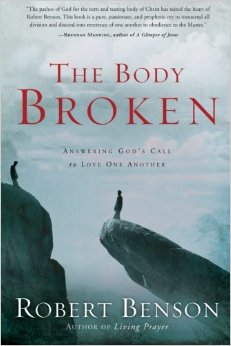 So heavy was my heart on these matters that yesterday I re-read, yet again, one of my favorite books, the utterly beautiful and truly lovely The Body Broken: Answering God’s Call to Love One Another by Robert Benson (Waterbrook; $10.99.) I was wiping tears off my cheek yet again last night as I read of his own journey, his shift from Nazarene to Methodist to Episcopalian, and his wish for his many friends to know one another, to care for one another, to live into the unity Christ desires and prays for, knowing that what unites us is greater then what divides us.
So heavy was my heart on these matters that yesterday I re-read, yet again, one of my favorite books, the utterly beautiful and truly lovely The Body Broken: Answering God’s Call to Love One Another by Robert Benson (Waterbrook; $10.99.) I was wiping tears off my cheek yet again last night as I read of his own journey, his shift from Nazarene to Methodist to Episcopalian, and his wish for his many friends to know one another, to care for one another, to live into the unity Christ desires and prays for, knowing that what unites us is greater then what divides us.
Benson (a really enjoyable author who has written some of my favorite books, on topics as unique as vacationing and baseball and landscaping and writing) is mostly known as a retreat leader, an author who writes about contemplative spirituality and books about prayer, Benedictine formation and the like. Consequently, he has spent time among many, many, different kind of Christians, and I related to his story a lot. A lot. I suspect some BookNotes friends will too.
He writes,
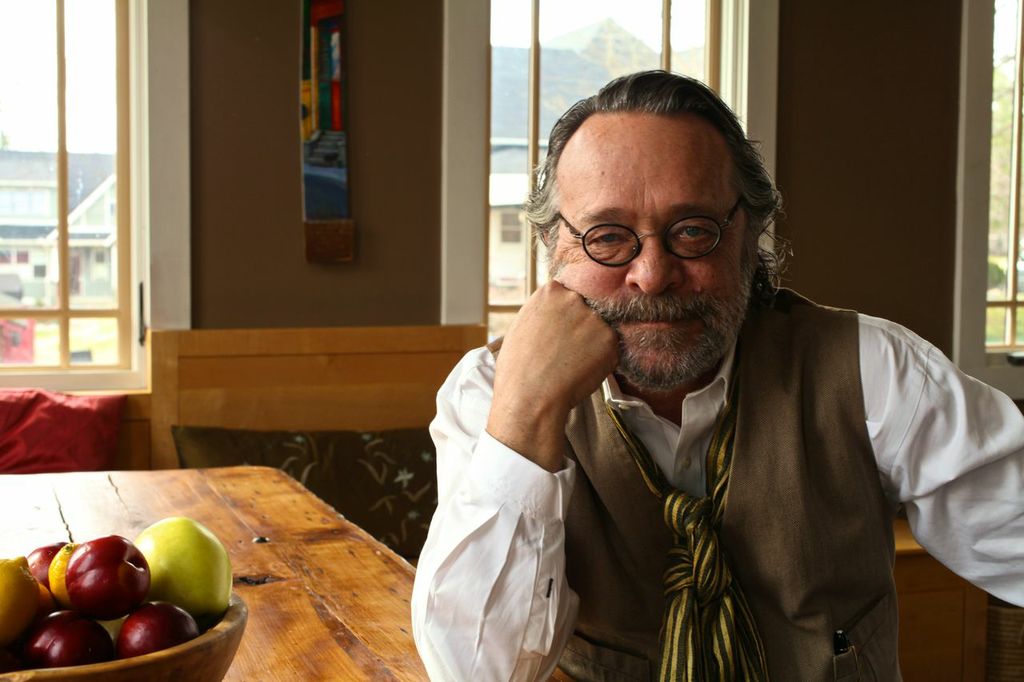 I have been called to worship by praise choruses and gospel tunes, Wesley hymns and Latin chants. I have sung along with rock and roll quartets, cathedral choirs, and string ensembles.
I have been called to worship by praise choruses and gospel tunes, Wesley hymns and Latin chants. I have sung along with rock and roll quartets, cathedral choirs, and string ensembles.
I have entered the courts of praise when they were in dusty circles around a campfire, in tents with sawdust on the floor, in convention centers with big screens provided so that we could see what was going on up on the stage because it was so far away, in candlelit monastery chapels, in cathedrals in which you could hardly breathe for the weight of the history that is present there, and nearly everywhere in between.
I have stood shoulder to shoulder with charismatics, fundamentalist, evangelicals, Jesus freaks, mainstreamers, and all manner of liturgical folk. I have smelled incense, shaken a tambourine, genuflected before the altar, bowed as the cross is carried past in procession, and passed the peace. I have prayed through, prayed silently, prayed collects, prayed Psalms, and chanted night prayers. I have heard evangelists, preachers, ministers, deans, canons, bishops, superintendents, chaplains, lay ministers, and all others kinds of authorities as they stood in front of some portion of the faithful and sermonized.
I myself have been a special speaker, a keynote addresser, a guest testifier, a retreat leader, a lay reader. I have taught a Sunday school class, led a church school class, coordinated a Christian adult education hour, and lectured in a symposium.
Ha. If only he mentioned speaking in tongues in a dorm room, or praying the psalms in a jail cell, or teaching the Bible at a political protest, or preaching the gospel during the set of a famous, druggy rock band, I’d have to say this list covers my life, too.
And like Benson, “I have studied
just enough Church history to be dangerous.” And, like him, I resonate
with his reminder – drawn from a passage from the second century (about
150 AD) First Apology of Justin the Martyr who clarified the heart of Christian worship.
Benson the Dangerous Church Historian tells us a bit about that ancient letter, and shows how most of us still do these things today. And then he says,
By and large, the pattern that Justin describes is the same pattern we follow today, whether we are aware of it or not. It is true from the Biltmore Holiness Temple to the First So-and-So Church on the corner to the Abbey of Gethsemani to the Winchester Cathedral and everywhere in between.
After explaining this simple secret of the few key things that all Christians do in worship, he concludes,
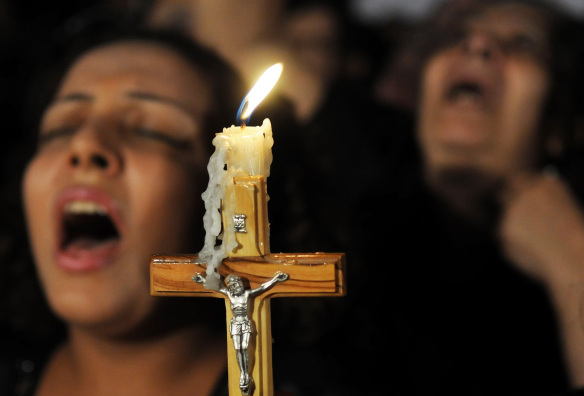 We are welcome to say that we do not like what this group does about this or that part of worship, but we need to be very careful about declaring that we know whether or not God likes it. It helps to remember that the worship is not for us anyway, it is for God. It behooves us to use caution when we start to tell others just what particular praises God will or will not inhabit. There is a scriptural evidence to suggest that God has gone for everything from dancing naked before the Lord to sacrificing lambs to speaking in tongues to blowing a ram’s horn to going off to a mountain to pray alone.
We are welcome to say that we do not like what this group does about this or that part of worship, but we need to be very careful about declaring that we know whether or not God likes it. It helps to remember that the worship is not for us anyway, it is for God. It behooves us to use caution when we start to tell others just what particular praises God will or will not inhabit. There is a scriptural evidence to suggest that God has gone for everything from dancing naked before the Lord to sacrificing lambs to speaking in tongues to blowing a ram’s horn to going off to a mountain to pray alone.
I happen to be of the opinion at this point in my life that God would choose Bach over rock and roll, but who am I to say? Who are any of us to say what God loves to hear from those whom God loves?
These are not the best lines from the book, nor the most compelling insights. But I share them for a few reasons: it’s sort of fun to see his list of worshiping styles and churchy lingo (is it Sunday school or adult ed? praying through or centering prayer? Ha!) But, this is important for Benson, ancient liturgy guy that he is. What we do in worship together – in response to a God who loves us – isn’t worth fighting about because God loves us so. And, frankly, none of us fully knows, really, what God really prefers.
Did you get that last line of the quote?
“Who are any of us to say what God loves to hear from those whom God loves?” That is a quintessential line from Benson, elegant, sensible, and, finally, jaw-dropping in its importance. God loves others.
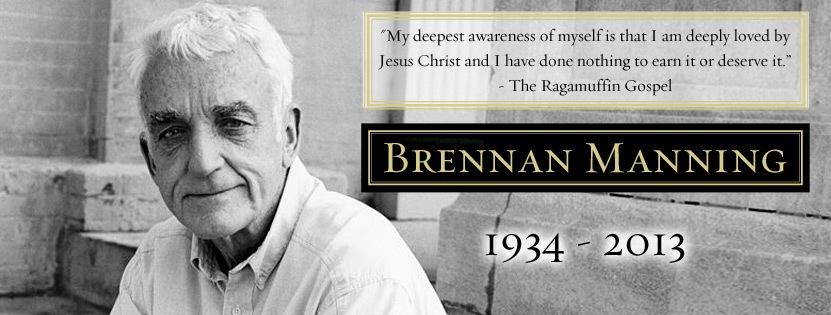 Brennan Manning not surprisingly makes an appearance in this book, as does Henri Nouwen. (It is well worth the price of admission just to sit in with Robert and Henri laughing at a New York apartment,
Brennan Manning not surprisingly makes an appearance in this book, as does Henri Nouwen. (It is well worth the price of admission just to sit in with Robert and Henri laughing at a New York apartment, 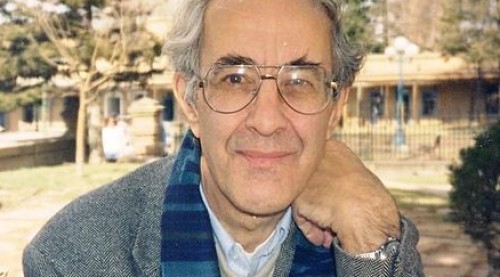 realizing they were praying through the same book that same evening, watching as Henri hands Robert his plate of spaghetti, runs to his room to gather up the book in question, and read from it out loud. There is a story that is almost too amazing to believe – one about his friend Father Ed and a story of an old Irish priest – and there is a tender part with Robert telling about the suicide of his brother, and their relationship, strained and healed. The telling about an annual Nashville Christmas party is sublime, although some will be offended, I suppose. The evangelical guys who read the Mars Hill Review driving hours to Tennessee just to check in on him (and his initial misunderstanding the reason for their visit) is priceless. The Body Broken: Answering God’s Call to Love One Another is a remarkably enjoyable book, with great stories, told in very good, solid prose.
realizing they were praying through the same book that same evening, watching as Henri hands Robert his plate of spaghetti, runs to his room to gather up the book in question, and read from it out loud. There is a story that is almost too amazing to believe – one about his friend Father Ed and a story of an old Irish priest – and there is a tender part with Robert telling about the suicide of his brother, and their relationship, strained and healed. The telling about an annual Nashville Christmas party is sublime, although some will be offended, I suppose. The evangelical guys who read the Mars Hill Review driving hours to Tennessee just to check in on him (and his initial misunderstanding the reason for their visit) is priceless. The Body Broken: Answering God’s Call to Love One Another is a remarkably enjoyable book, with great stories, told in very good, solid prose.
About this evangelical crew’s occasional visits — driving several hours on the interstate to eat lunch with him — Benson ruminates, following up an earlier part of the chapter about the deepest core truths that Christians agree upon, and how this is enough to bring us together in spiritual friendship. He writes,
I have begun to consider their coming to see me as an act of prayer. I asked them once if they were getting missionary points from their denomination for coming to visit an often-uncertain Episcopalian. They are not, of course; they have just decided that we belong to each other.
We are not bound together by dogma or doctrine or form or denomination. Indeed, if you lay down a list of the things that describe the ways we live our lives, and the ways that we live out our faith, it would be easy to make a case that we are too different to even be terribly tolerant of each other. Some would say that our core beliefs are not the same at all. Some would advise us to be careful around each other, that our use of such different words to describe our faith is a sign that we are not really brothers. Some would say that we certainly are not on the same pew or maybe even in the same building.
We are bound together because we are trying to learn to pray, because we are learning to listen for the voice of the One Who made us, and the One Who came among us and the One Who will lead us into all truth and eventually lead us home. We are bound together by our willingness to honor one another’s witness to that voice in all that we do.
We are bound together because we have begun to realize that a part of our work as members of the Body of Christ is to honor one another’s attempts to be faithful, recognizing our brotherhood even as we acknowledge our differences. We are bound to one another because of our core beliefs.
Benson, you may recall from other reviews I’ve done, or from reading some of his others books, used to work in the gospel music biz. He once traveled with a pretty fundamentalist tribe, and he has shifted to a less dogmatic theological stance and a more liturgical church, embracing a mysterious, sacramental worldview.
But still, he tells us, he is often invited to writer’s conferences or prayer retreats among evangelicals. He has to work, of course, and feels called to doing these gigs, but he writes about them in ways that those of us who do such work can appreciate. (He is not snarky, and often is surprised and delighted by the goodness of those hosting him, but it is work, after all, being away from home, being extroverted for a weekend, hanging with those whose styles and beliefs are grating.) At one such event he tried to avoid the happy-clappy worship, slinking out to pray in private or stroll around the grounds in the moonlight.
However, on the last night of the event they “faked me out, though I do not think they intended to trick me.” The workshop leaders all were on the front stage, so they had to be there, in front of everyone, during the exuberant praise. You can imagine his discomfort.
For the next twenty minutes, the crowd sang and clapped together. I kept trying to find something to do with myself so that I would not look so lost that anyone would notice. After a while, I did what I had seen monks do, and that was to just close my eyes with my hands folded in my lap meditating my way to some distant place and trying for a beatific look on my face. After four or five days around so many other humans, what I needed most was silence, not more noise, even if it was of the joyful kind. So off I went, so to speak.
I should let him tell it, but you might guess: everyone rises, but he misses that, so is the only one blissed out, sitting down in front of the whole group. Eventually, he opens his eyes, to his embarrassment. And, then, this:
The other thing I noticed was that I was looking up into this sea of faces that were shining so brightly and so sweetly that I could hardly bear it. No wonder God likes these people, I thought to myself.
So I stood up.
Unlike most others, I kept my hands in my pockets; but I stood up so I could be counted. I want to be in that number.
I get choked up reading that, and I think I know why. Here, again, is the essential goodness of my long-distance hero, Robert Benson. He is a socially progressive, theologically liberal, liturgical Episcopalian who does not disdain evangelicals, is not spooked away by ordinary Christian folks like this. He loves the people God loves, sees the best in others. He wants to be in that number.
My dear friends, I want to be in that number. I hope you do, too.
There is serious Biblical and theological work to do on the issues that divide us, not least on the role of proper Biblical interpretation itself. I know that. But it is work we must do together, side by side sometimes, in a spirit of generous orthodoxy. Benson doesn’t care to think much about these hard theological topics, because he is a mystic, and sees through the window into the Mystery through that relational/experiential lens. But his warm and tender and profound insights about our essential unity and the spiritual maturity to be gracious and generous with others with whom we disagree, is simply the best place to start. He is just a bit light-hearted (remember what Chesterton said about not taking ourselves too seriously) and he is not too grumpy about others.
“It comes to me then,” he writes. “It comes to me finally, irrevocably, utterly – I belong to them all, and they all belong to me. Anyone, anywhere, who says otherwise is as wrong as they can be, no matter how well intentioned or thoughtful they happen to be.”
He gets a bit polemical, prophetic, even, as he calls us to hard work, living into this truth that we belong to each other.
We must seek out the things that we have in common and at the same time learn to honor the things that make us different. We must learn to take the things that we hold dear – our sense of community, our love for the scriptures, our hunger for prayer, our capacity for worship – and work to make them wide enough and deep enough to include others rather than keep them at a distance.
We must be willing to cultivate humility along with certainty, to practice tolerance along with devotion, to seek patience along with piety.
We must learn to seek the face of Christ in those who are different as readily as we do in the faces of those who are like us.
We must learn to love one another.
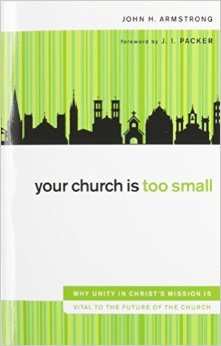 Your Church Is Too Small: Why Unity in Christ’s Mission is Vital to the Future of the Church John H. Armstrong (Zondervan) $18.99 I want to give a shout out to this important book, as I have a few times before, because it is another way into this important conversation, with a different approach and tone then the lovely one by the elegant memoirist and spiritual writer, Mr. Benson. This one is also clear as can be, touched with passion and some degree of personal testimony, but it is more clearly evangelical and more clearly theological in nature. It makes a fine supplement to the memoir and storytelling of Benson, offering rigorous Biblical teaching and solid theological insight to underscore our work towards a generous orthodoxy. You can learn more about the author at his excellent ACT3 Network webpage.
Your Church Is Too Small: Why Unity in Christ’s Mission is Vital to the Future of the Church John H. Armstrong (Zondervan) $18.99 I want to give a shout out to this important book, as I have a few times before, because it is another way into this important conversation, with a different approach and tone then the lovely one by the elegant memoirist and spiritual writer, Mr. Benson. This one is also clear as can be, touched with passion and some degree of personal testimony, but it is more clearly evangelical and more clearly theological in nature. It makes a fine supplement to the memoir and storytelling of Benson, offering rigorous Biblical teaching and solid theological insight to underscore our work towards a generous orthodoxy. You can learn more about the author at his excellent ACT3 Network webpage.
John Armstrong, not unlike Benson, is very familiar with the right end of the pew. He has written other books about revival, was schooled in the profound theology that led to the Great Awakening — Jonathan Edwards, Cotton Mather, Richard Baxter, Richard Sibbes, and the like. He’s a strong, conservative Calvinist, and a great, great Bible preacher. (And like Benson, he’s a baseball fanatic — I love to tell how we once tried to convince me to sneak out of a theology conference to run up to a Baltimore Orioles game, since he had not been to their great ball park, Camden Yards.)
Well, not only did Armstrong allow his playful desire for baseball lead him from the conference (he did come back, of course – he had to speak!) but his creative and open mind and pleasant nature eventually led him to fellowship with others outside his own narrow Calvinist circles. He became friends with Chicago area Roman Catholics, with Anglicans, Orthodox leaders, with authors as diverse as Tom Wright and others he formerly would have looked at with suspicion for not being straight and narrow enough. He now works a bit with the Catholic Acton Institute in Grand Rapids, doing research with old school natural law scholars, travels and speaks and networks others in this good project of expanding our vision of the church.
Your Church is Too Small is a Biblical and theological introduction to ecumenical thinking, a plea for ordinary folks – mostly evangelical Protestants, I suppose, given that is is published on Zondervan – to embrace a bigger view of the church. That’s the point of the title, of course, not that the church is about numbers, but about theological depth and breadth. It is your view of the church that may be too small.
If you don’t get that, I’d say, he may be right, and this book might be a very helpful corrective. If you do get it, then you know how urgent and rare such reliable works are, and you will want to own this, and to share it with others in your own faith community.
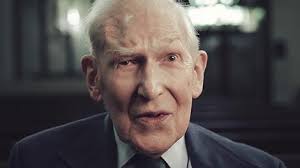 For those that care about such things, John says that he was mostly inspired to do this book by a 1950s era piece by one of his early mentors, the impeccable J.I. Packer (who has a splendid, powerful, compelling foreword to the book.) Dr. Packer, you may know if you follow this stuff, had his own generous orthodoxy rebuked in those years, as evangelicals in England tried to figure out their own relationship with the state church and others. Conservative Calvinist that he was, he still opted for staying in fellowship with the broader communion. As theological and
For those that care about such things, John says that he was mostly inspired to do this book by a 1950s era piece by one of his early mentors, the impeccable J.I. Packer (who has a splendid, powerful, compelling foreword to the book.) Dr. Packer, you may know if you follow this stuff, had his own generous orthodoxy rebuked in those years, as evangelicals in England tried to figure out their own relationship with the state church and others. Conservative Calvinist that he was, he still opted for staying in fellowship with the broader communion. As theological and 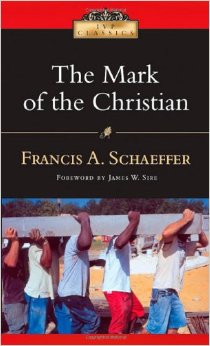 ecclesiastical moves continue to strain the worldwide communion of the Anglicans, and other denominations, his stance is a brave and principled one, and I am glad that Packer so inspired Armstrong to take up this current work. And I am glad they both frame the loving exhibition of friendships of church folks as Francis Schaeffer once did in his must-read little volume The Mark of the Christian (IVP: $6.00) in terms of the mission of the church. Our love for one another is, as Schaeffer reminds us, the “final apologetic.”
ecclesiastical moves continue to strain the worldwide communion of the Anglicans, and other denominations, his stance is a brave and principled one, and I am glad that Packer so inspired Armstrong to take up this current work. And I am glad they both frame the loving exhibition of friendships of church folks as Francis Schaeffer once did in his must-read little volume The Mark of the Christian (IVP: $6.00) in terms of the mission of the church. Our love for one another is, as Schaeffer reminds us, the “final apologetic.”
I’m also glad that John Armstrong quotes the 19th century Mercersburg theologian, Philip Schaeff, (who we were studying at the event in Lancaster) asserting bluntly that sectarianism is our enemy.
And yet, Armstrong explains that he believes we should each think our own church is right. (Why would one want to be involved in a church that one thinks is mostly wrong?) But the problem is when we think our church is entirely right. Such thinking, he says,
…inflames our pride and promotes attitudes that oppose catholicity. We must resist the kind of intellectual certitude that will not allow for change and growth in one’s own perspective and understanding.
John continues,
I defended sectarianism for decades. I instinctively knew in my heart that there were other Christians in other churches, but I had no place in my affections for Roman Catholics, the Orthodox, or even some (less conservative) Protestants. This is why the “conversion” moment I experienced was so life-giving.
Yes, that’s partially it: his “conversion” to a more generous sort of ecumenical vision was “life-giving.”
I think it is life-giving for anyone who learns to be more gracious, perhaps in the manner of Robert Benson. And it is life-giving for the churches themselves, as we learn from one another and enhance one another in healthy conversations. Lastly, it is life-giving for the watching world, who Jesus himself said can only know that Christ is who He said He was insofar as Christians love one another.
Re-read John 17 and buy the little Schaeffer book if you think I’m overstating it. This stuff matters! It is why J.I. Packer himself writes of John Armstrong’s Your Church is Too Small: Why Unity in Christ’s Mission is Vital to the Future of the Church “I hope this book will not be ignored but will have the influence it deserves. Aspects of North America’s future — aspects, indeed, of the honor and glory of Christ in this century — may well depend on whether or not it does.”


BookNotes
DISCOUNT
ANY ITEM MENTIONED
20% off
order here
takes you to the secure Hearts & Minds order form page
just tell us what you want
inquire here
if you have questions or need more information
just ask us what you want to know
Hearts & Minds 234 East Main Street Dallastown, PA 17313 717-246-3333
